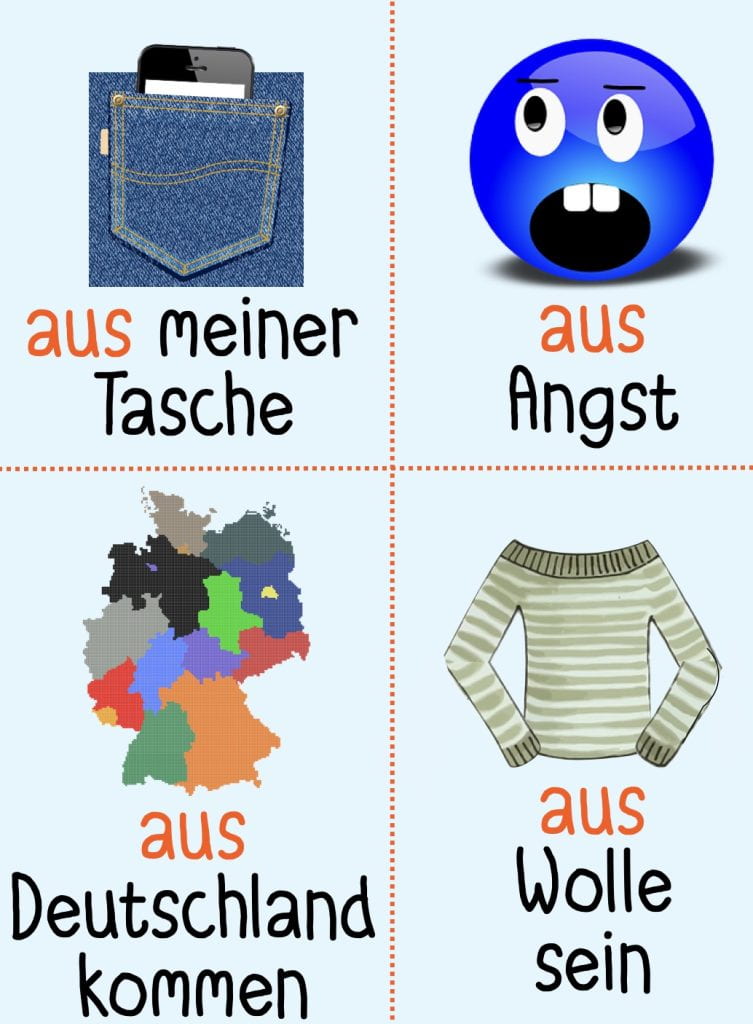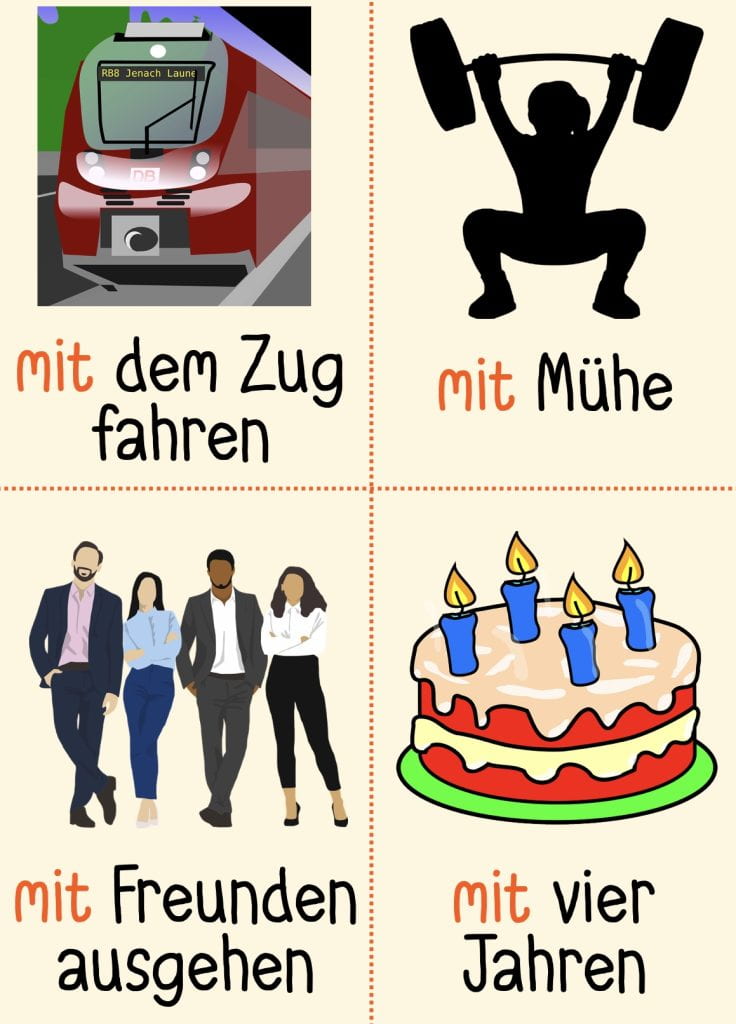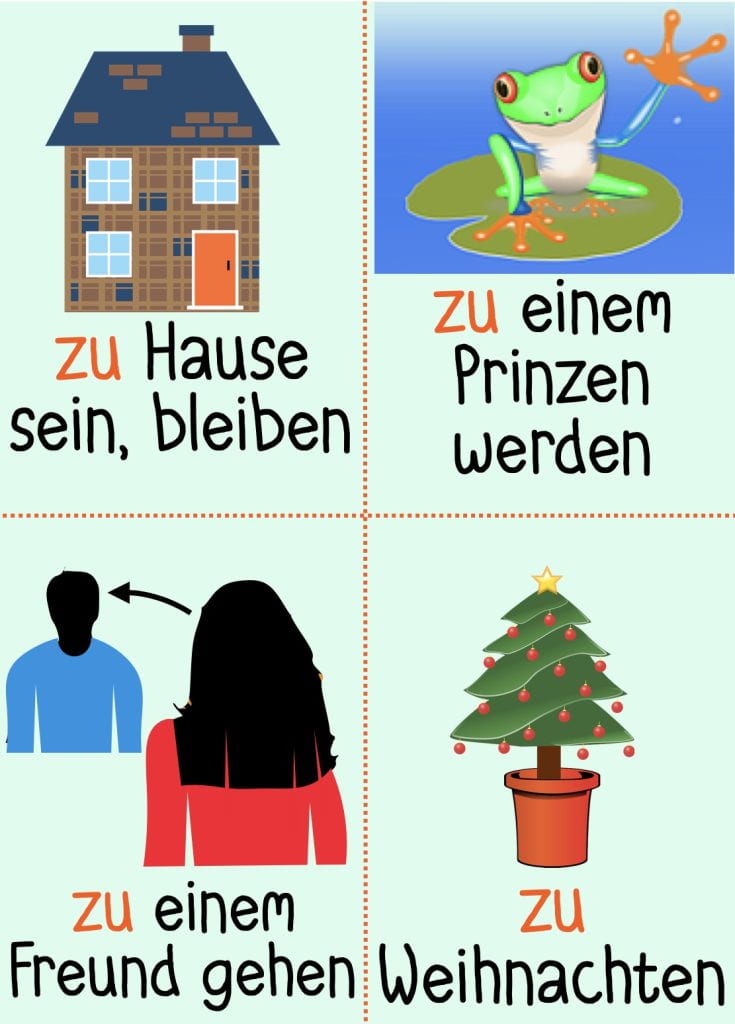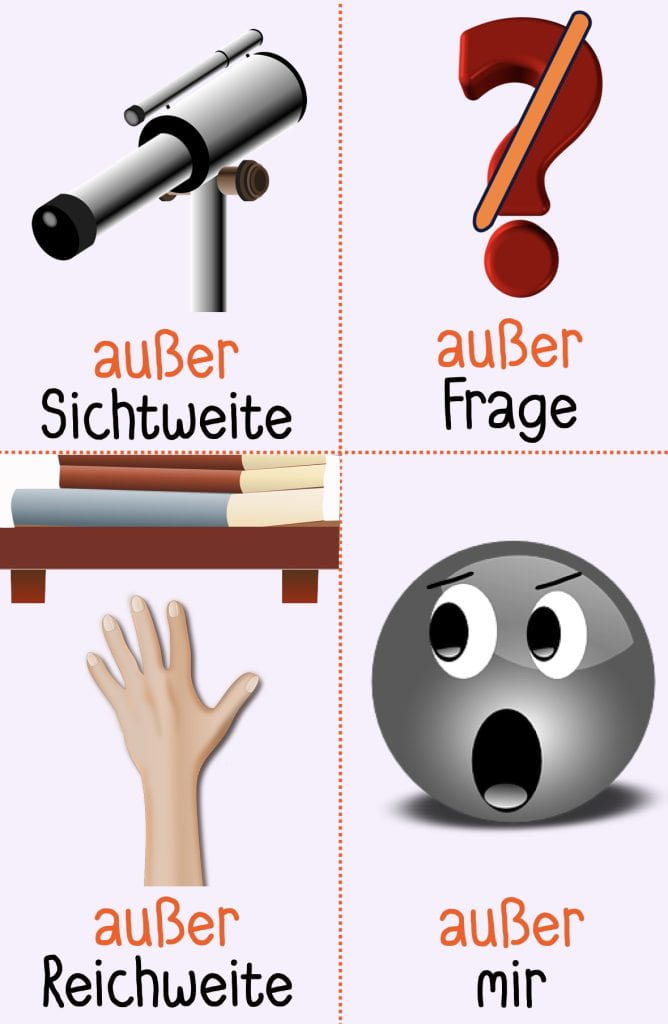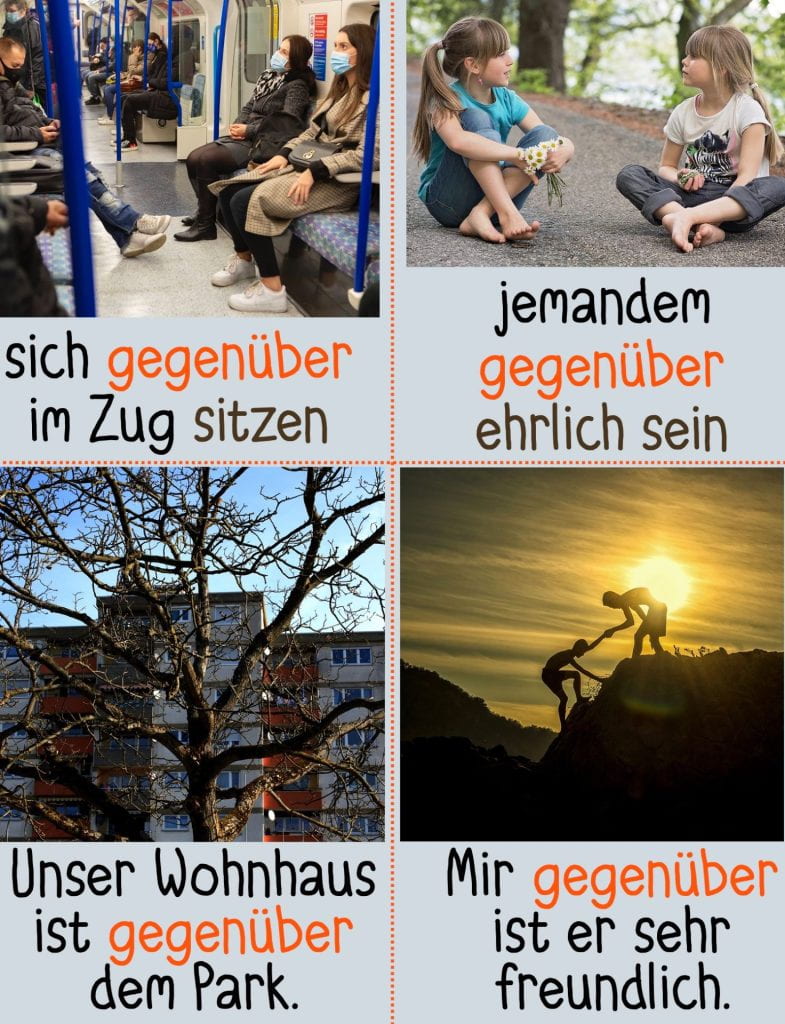This page was constructed in December 2022.
Nine German Prepositions that Trigger the Dative Case
These nine essential prepositions are always followed by the dative case. The example sentences below clarify their meaning and illustrate their usage. Click on each preposition in the list to jump to its description:
bei | aus | mit | zu | von | außer | nach | gegenüber | seit
KEY: Masculine Nouns • Feminine Nouns • Neuter Nouns • Plural Nouns • Prepositions • Dative Pronouns
bei ➡️ near, at, with, during, at a specific time, in a specific place, in particular conditions
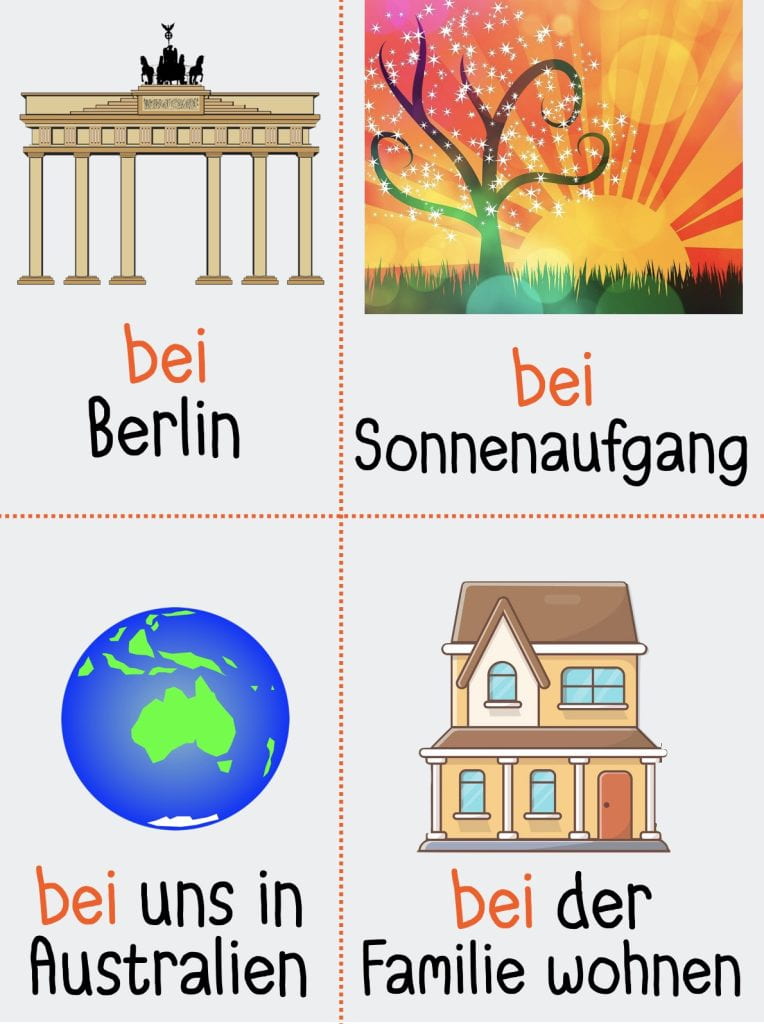
Note: There are 18 uses of bei given in the Langenscheidt Großwörterbuch Deutsch als Fremdsprache. The examples on the right are a mere introduction to the power of this little word.
Examples
Die Familie hat ein kleines Haus bei Berlin. ⇢ The family has a small house near Berlin.
Ich habe die Schokolade bei Woolworth gekauft. ⇢ I bought the chocolates at Woolworths.
Sie wohnt noch bei ihrer Familie, weil die Mietkosten sehr hoch sind. ⇢ She still lives with her family because the cost of renting is so high.
Bei Sonnenaufgang bin ich aufgewacht und spazieren gegangen. ⇢ I woke up at sunrise and went for a walk.
Bei uns in Australien ist es üblich, andere Menschen mit dem Vornamen anzusprechen. ⇢ It is commonly accepted in Australia to address one another by first names.
Bei schönem Wetter gehen wir oft zum Strand. ⇢ When the weather is fine, we often go to the beach.
Er arbeitet bei der Post. ⇢ He works for the postal service.
Examples
Die Kinder stammen aus armen Familien. ⇢ The children originate from poor families.
Ich habe mein Handy aus meiner Tasche genommen. ⇢ I took my phone out of my pocket.
Deine Mutter kommt aus Kambodscha, nicht wahr? ⇢ Your mother comes from Cambodia, doesn’t she?
Der Pulli ist aus Wolle. ⇢ The jumper is made of wool.
Der Junge hat nur aus Angst gelogen. Sei nicht zu streng mit ihm. ⇢ The boy only lied because he was afraid. Don’t be too hard on him.
Examples
Sie hat es nur mit Mühe geschafft. ⇢ She managed it only with difficulty.
Ich gehe gern mit meinen Freunden* aus. ⇢ I like going out with my friends.
Hast du Lust, mit uns ins Kino zu gehen? ⇢ Do you feel like coming with us to the movies?
Sie fahren mit der Straßenbahn ins Stadtzentrum. ⇢ They are going into the city centre by tram.
Mit zwanzig Jahren* ist er aus China ausgewandert. ⇢ At the age of 20, he emigrated from China.
*Note the dative -n ending on plural nouns.
Examples
Heute Abend gehen wir zu einer Freundin. Vielleicht werden wir bei ihr übernachten. ⇢ This evening we are going to a girlfriend’s place. Perhaps we’ll sleep over at her place.
Der Frosch ist zu einem Prinzen geworden. ⇢ The frog turned into a prince.
•Wollen wir zu Fuß hingehen? •Nein, wir nehmen das Auto. ⇢ •Shall we go on foot? •No, we’ll take the car.
Zu Weihnachten haben wir immer ein großes Familienfest. ⇢ We always have a big family party at Christmas.
Meine Mutter ist nicht zu Hause. ⇢ My mother is not (at) home.
Examples
Das ist lieb / nett von dir. ⇢ That’s kind / nice of you.
Der Krimi ist von Andrea Camilleri, einem italienischen Autor. ⇢ The crime novel is by Andrea Camilleri, an Italian writer.
Der Zug kommt von Paris. ⇢ The train is coming from Paris.
Von jetzt an müssen wir Energie sparen, um die Umwelt zu schützen. ⇢ From now on we need to save energy to protect the environment.
Ich habe viel von dir gehört. ⇢ I’ve heard a lot about you.
Du darfst niemandem von dieser Situation erzählen! ⇢ You mustn’t tell anyone about this situation.
Examples
- außer Atem – out of breath
- außer Gefahr – out of danger
- außer Hörweite – out of hearing range
- außer Dienst – out of or not in service, off duty
- außer Betrieb – out of order
Außer ein paar blauen Flecken ist sie unverletzt. ⇢ Except for a few bruises she’s uninjured.
Außer dir habe ich niemanden, dem ich vertrauen kann. ⇢ Apart from you I have no one I can trust.
Außer Englisch spricht die Lehrerin Russisch und Deutsch. ⇢ As well as English, the teacher speaks Russian and German.
Das Schuljahr ist zu Ende. Ich bin außer mir vor Freude. ⇢ The school year is over. I’m beside myself with joy.
nach ➡️ to, past, after
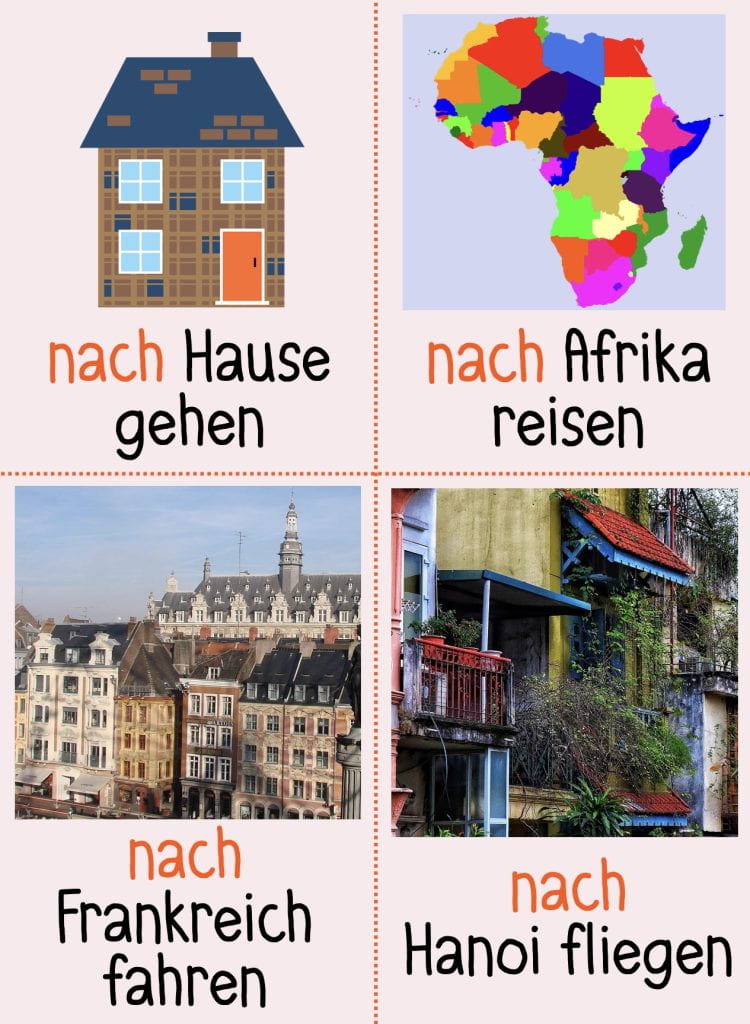
An excellent summary of going to the countries with articles: Deutschtraining.com
Examples
Going home: Ich bin erschöpft. Ich gehe nach Hause. ⇢ I’m exhausted. I’m going home.
Going to a continent: Nächste Woche fliegen wir nach Europa. ⇢ We’re flying to Europe next week.
Going to cities or towns: Der Zug nach Paris hat Verspätung. ⇢ The train to Paris is running late.
Going to countries without articles: Wir reisen morgen nach Neuseeland ab. ⇢ We are leaving tomorrow for New Zealand.
After the hour: Es ist Viertel nach fünf. ⇢ It is quarter past five.
After an event: Nach der Schule spielen wir Fußball im Park. ⇢ After school we play football in the park.
In a direction: Wir fahren nach Süden. ⇢ We are heading south.
Examples
Unser Haus steht gegenüber einem Park. – Our house is opposite a park.
Der Grundschule gegenüber steht das Feuerwehrhaus. – Opposite the primary school is the fire station.
Auf der Party hat er sich uns gegenüber gesetzt. – He sat down across from us at the party.
Er ist mir gegenüber immer sehr höflich. ⇢ Towards/with me, he is always very courteous.
seit ➡️ for, since
*Note the German use of the present tense with seit whenever the action continues into the present. In English, the perfect tense is required in such cases.
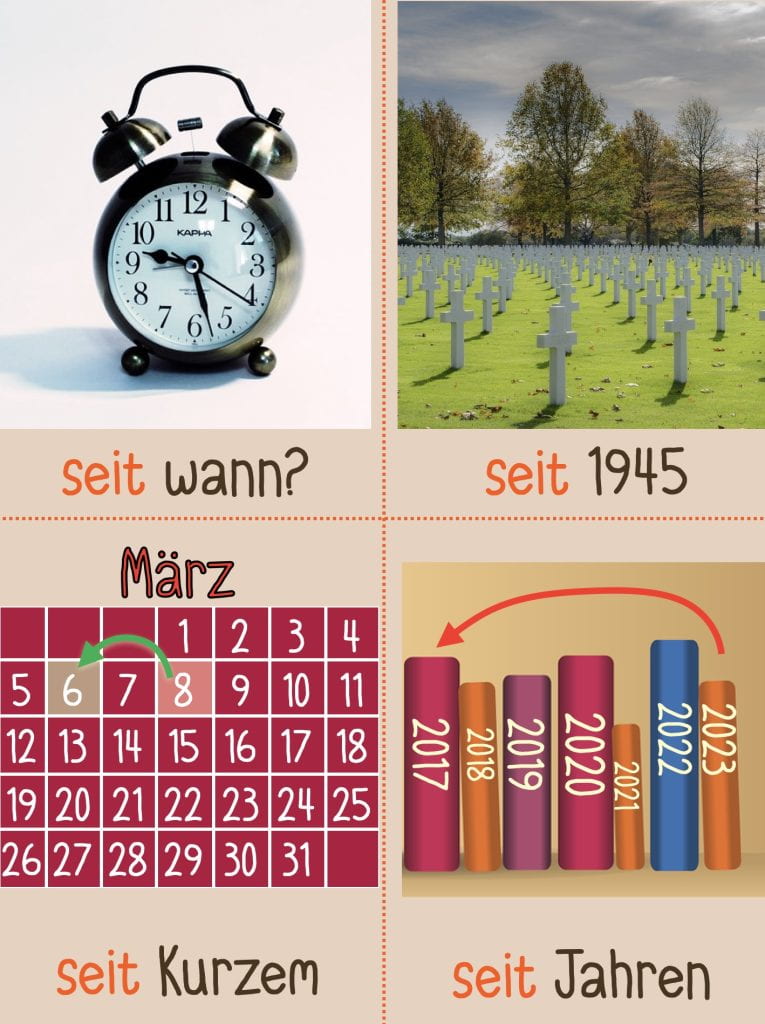
Examples
Wir kennen uns seit ewig. ⇢ We’ve known each other for ages / for ever.
Seit zwei Jahren habe ich ihn nicht mehr gesehen. ⇢ I haven’t seen him for two years.
Ich lerne schon seit zehn Jahren Deutsch. ⇢ I have been learning German for ten years.
Muslime tragen seit dem Mittelalter zur europäischen Kultur und Wissenschaft bei. ⇢ Muslims have contributed to European culture and science since the Middle Ages.
Seit ihrer Kindheit sind die Mädchen enge Freundinnen. ⇢ The girls have been close friends since their childhood.
Quizzes

Quiz created at LearnClick: The Dative Prepositions
This quiz provides practice with all the prepositions above and especially focuses on “bei” in the final question.

Quiz created at LearningApps: 9 Dative Prepositions, 2 Life Stories
Each snippet of a life story contains all 9 of the dative prepositions described above.
